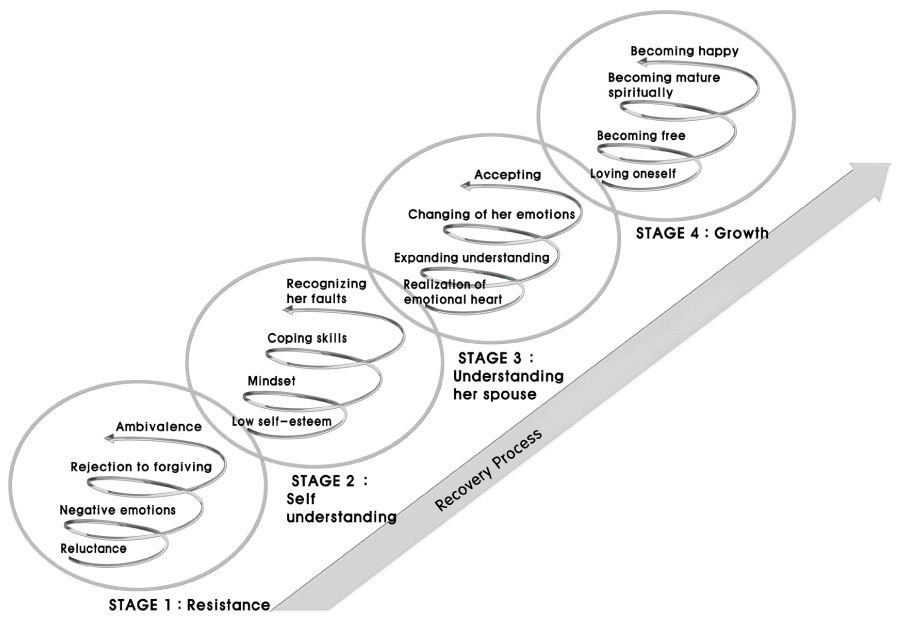J Korean Acad Psychiatr Ment Health Nurs.
2014 Jun;23(2):70-81.
A Qualitative Study on Forgiveness Experience by Wives of Alcohol Abusers
- Affiliations
-
- 1Graduated School, Inha University, Incheon, Korea.
- 2Department of Nursing, Inha University, Incheon, Korea. peace-peace@hanmail.net
Abstract
- PURPOSE
This study was done to describe the forgiveness experience following participation in forgiveness therapy of wives of men who abuse alcohol.
METHODS
A qualitative research method was used to describe the lived experiences of the participants in forgiveness therapy. Sixteen wives of alcoholic men were purposefully sampled from two alcohol counseling centers located in South Korea. Forgiveness therapy consisted of 120-minutes sessions once weekly. The data were collected from four groups. Conversations in forgiveness therapy were recorded and dictated. Data were analyzed using the Fullilove's problem-oriented analysis method.
RESULTS
The experience of wives of alcohol abusing husbands can be described as "Resistant," "Self-understanding," "Understanding her spouse," and "Growth" following forgiveness therapy.
CONCLUSION
The results indicate that wives of men who abuse alcohol experienced recovery through forgiveness. Therefore forgiveness therapy can be used as an useful nursing intervention for inner healing and growth.
Keyword
Figure
Reference
-
1. Kim KS. The development and the effects of program for forgiveness. Korean J Youth Couns. 2002; 10(1):165–191.2. Bae MJ. The relationship between marital conflict coping behavior, forgiveness and marital satisfaction[master's thesis]. [Jeonju]: Jeonju University;2003. 65.3. Enright RD, Fitzgibbons RP. Helping clients forgive: an empirical guide for resolving anger and restoring hope. Washington D.C.: American Psychological Association;2000. p. 376.4. Park JH. A review of forgiveness psychological theory and education program. Korean J Hum Dev. 2006; 13(1):117–134.5. Kim KS. Reflective injury on empirical-scientific studies of forgiveness and suggestion for following forgiveness studies. Korean J Educ Psychol. 2004; 18(4):33–49.6. Enright RD. Forgiveness is a choice: a step-by-step process for resolving anger and restoring hope. Washington, DC: American Psychological Association;2001. p. 299.7. Enright RD. Human Development Study Group. The moral development of forgiveness. In : Kurtines WM, Gewirtz JL, editors. Handbook of moral behavior and development. Vol. 1. Hillsdale NJ: Lawrence Erlbaum Associates;1991. p. 123.8. McCullough ME, Fincham FD, Tsang JA. Forgiveness, forbearance, and time: the temporal unfolding of transgression-related interpersonal motivations. J Pers Soc Psychol. 2003; 84(3):540–557. http://dx.doi.org/10.1037/0022-3514.84.3.540.
Article9. Suh SH, Choi YS. A study on forgiveness among married men and women: focusing forgiveness process related variables. J Korean Home Manage Assoc. 2009; 27(4):81–101.10. Lee KW. The processes of life experiences that wives of alcoholic husbands have. J Korean Acad Psychiatr Ment Health Nurs. 2001; 10(3):406–420.11. Copello A, Orford J, Velleman R, Templeton L, Krishnan M. Methods for reducing alcohol and drug related family harm in non-specialist settings. J Ment Health. 2000; 9(3):329–343. http://dx.doi.org/10.1080/jmh.9.3.329.343.
Article12. Lee MH. Effects of group therapy on the mental health for alcoholic families. J Korean Acad Psychiatr Ment Health Nurs. 2000; 9(3):315–327.13. Kim KS. Development of education program for forgiveness [dissertation]. [Seoul]: Seoul University;1999. 257.14. Kim KS. Forgiveness psychological and education program. Gyeonggido: Korean Studies Information;2007. p. 249.15. The Society of Korean Language and Literature. Korean Dictionary. Kyounggi: Minjung;2001.16. Pickett J. The american heritage dictionary of the English language. 4th ed. Boston: Houghton Mifflin;2000.17. Yeu KD, Song KS, Lee MH. Recovery of people living with mental illness: a concept analysis. J Korean Acad Soc Home Care Nurs. 2012; 19(1):46–54.18. Coyle CT, Enright RD. Forgiveness intervention with postabortion men. J Consult Clin Psychol. 1997; 65(6):1042–1046. http://dx.doi.org/10.1037/0022-006X.65.6.1042.
Article19. Chang WS. The effect of the group forgiveness program on anger, anxiety and depression for female elders. J Korean Gerontol Soc. 2010; 30(1):109–126.20. Lee KS. A qualitative research on the processes of forgiveness. Korean J Health Psychol. 2008; 13(1):237–252.
Article21. Kim HK. Lived experience of forgiveness for the victim of crime with psychological trauma. Korean J Qual Res Soc Welf. 2011; 5(1):59–85.22. Park YS. The intervention for self-differentiation improvement of alcoholic spouses: using Bowen's family systems theory[master's thesis]. [Seoul]: Seoul Theological University;2007. 88.23. Fullilove MT. The little handbook. New York: Columbia University;2001. p. 50.24. Lee KW. The resilience of problem drinkers' wives [dissertation]. [Seoul]: Hallym University;2006. 253.25. Lee KS. Forgiveness: phenomenological approach. J Korean Acad Psychiatr Ment Health Nurs. 2002; 11(3):388–397.26. Choi SS, Lee SJ. A study on the life experiences of a recovering alcoholic's spouse. Soc Sci Res Rev Kyungsung Univ. 2012; 28(3):431–462.27. Ko BI. Self care. Seoul: Korean Recovery Ministry Institute;2006. p. 70.28. Lee KS. Concept analysis of forgiveness. J Korean Acad Psychiatr Ment Health Nurs. 1998; 7(2):325–332.29. Yang S, Lee SY, Cha JK. Effects of imago psychotherapy on co-dependency and mental health in wives of alcoholics. J Korean Acad Psychiatr Ment Health Nurs. 2005; 14(3):313–322.
- Full Text Links
- Actions
-
Cited
- CITED
-
- Close
- Share
- Similar articles
-
- Factors Affecting Forgiveness of Wives of Alcoholics
- Effectiveness of Forgiveness Therapy on Resilience, Self-esteem, and Spirituality of Wives of Alcoholics
- Effects of Forgiveness Therapy Program on Self-esteem, Anger, and Forgiveness in People who Abuse Alcohol
- A Phenomenological Study on the Experience of Hurt and Forgiveness of Clinical Nurses in Korea after Loss of Employment
- Self-Forgiveness Moderates the Effects of Depression on Suicidality


